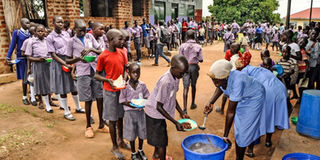Prime
Drought frustrates Gulu schools feeding programme

Meal time. Pupils of Lukodi Primary School in Gulu District during lunch time last Friday. PHOTO BY JULIUS OCUNGI
A number of parents in Gulu District have failed to contribute maize and beans to support the compulsory school feeding programme, Daily Monitor has learnt.
Gulu District local government in March last year, passed a resolution compelling parents to each contribute beans and maize grain to schools to cater for their children’s breakfast and lunch as part of the government efforts to retain pupils in schools.
Under the programme, a parent is expected to contribute 5kgs of beans and 10kgs of maize grain per pupil each term.
However, in some schools this reporter visited, few parents have made food contribution this term, citing poor harvest in the last farming season.
Ms Margaret Ayaa, 52, a resident of Ongutu Village in Awach Sub-county, also a mother of four children who study at Oguru Primary School, says the problem was worsened this year following the prolonged drought.
“My four children are being fed on food contribution from my fellow parents. I don’t have any maize grain and beans in my house. What I planted last year all dried up because of the dry spell,” she says.
“This year, I thought the rain would come early but it delayed. Worst of all when it started raining, it was too heavy hence destroying the maize and beans I planted,” she adds.
Northern Uganda suffered drought between August last year and late March, leaving many farmers affected.
Although she pleaded with the school authority to excuse her, Ms Ayaa is sceptical whether her children will be allowed to eat freely with others whose parents have paid.
“I have now planned for an acre of garden in which I planted beans and maize to help me contribute to the school feeding programme for my children and others in third term and first term 2020,” Ms Ayaa says.
Mr Justine Komakech, the chairperson of the school feeding programme at Oguru Primary School, told Daily Monitor in an interview at the weekend that they are likely not to get enough food for feeding pupils because of last year’s bad weather.
He said only 309 parents of the 688 whose children turned up for studies, have made contribution towards school feeding programme this term.
Mr Komakech adds that the same problem occurred in the first term when only 678 parents out of 947 fully contributed to the feeding programme.
He notes that failure by other parents to contribute food is making others to withdraw from the programme because they feel cheated.
For instance, Mr Komakech says in first term, parents contributed only 4,007kgs of maize and 1,898kgs beans, which was not enough to feed 947 pupils registered.
The school had expected to receive 4,735kgs and 9,470kgs of beans and maize flour respectively.
Mr Komakeck also reveals that the school is facing challenges of lack of proper storage facilities.
However, World Food Programme recently contributed seven silos [three plastic and four metallic silos] to help the school in storing the grains.
Mr Joseph Okello Ogweng, the resilience programme policy officer/Food System Unit at WFP, told Daily Monitor in an interview that they donated the silos on request of the district as the food was being affected by pests.
Mr Ogweng says so far 33 schools have received more than 100 silos out of the targeted 55 primary schools where the school feeding programme is being implemented.
Mr Caesar Akena, the Gulu District education officer, says they are still encouraging parents to be part of the programme.
Background
Inspection. Ms Rose Mary Sseninde, the Minister of State for Primary Education, last week visited four schools in Gulu District to find out the impact of the school feeding programme. These included Ogurul, Lukodi, Panykworo and Awach primary schools. Speaking to school heads and other stakeholders during her visit, Ms Sseninde said she was impressed with the significant progress the programme has registered in the district and its impacts on pupil’s performance.
She encouraged parents to be part of the programme to make it successful. The minister, however, tasked management of the various schools where the programme is being implemented to embrace growing of vegetables to supplement the diet of the children.
The Ministry of Education launched the guidelines for school feeding programme in 2015 outlining that feeding and nutrition education programmes are necessary in schools since they have been known to promote and improve physiological growth, school enrolment, learning and overall cognition.
Progress
At Panykworo Primary School in Bungatira Sub-county most parents have embraced the school feeding programme.
Mr Robert Abala, the head teacher of the school, said ever since the school feeding programme was rolled out in 2016, the school has registered significant progress in performance and enrolment of pupils. He said the school now has more girls [682] compared to boys [637] at school and that in last year’s Primary Leaving Examination, their pupils passed in Division one and Two only.


